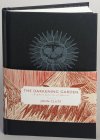Excerpts from the discussion:
 Gary K. Wolfe: “In a sense, this discussion centers around three books. The first came out in 1944 from Random House, Great Tales of Terror and the Supernatural, edited by Phyllis Cerf Wagner & Herbert Wise, and for generations established a kind of canon of what supernatural and horror literature looked like. The Darkening Garden: A Short Lexicon of Horror is a very recent book by John Clute, a series of short essays in the form of a lexicon. A third book, Poe’s Children, an anthology which Peter Straub is still working on, is another way of redefining or reexamining what has happened to the horror genre. So we have one really old book, one brand new book and one incipient book. That raises the question of the definition of horror: what it was, what it isn’t, what it has become, and what it may become. John, was The Darkening Garden the result of your examination of a genre not fully covered in The Encyclopedia of Fantasy?”
Gary K. Wolfe: “In a sense, this discussion centers around three books. The first came out in 1944 from Random House, Great Tales of Terror and the Supernatural, edited by Phyllis Cerf Wagner & Herbert Wise, and for generations established a kind of canon of what supernatural and horror literature looked like. The Darkening Garden: A Short Lexicon of Horror is a very recent book by John Clute, a series of short essays in the form of a lexicon. A third book, Poe’s Children, an anthology which Peter Straub is still working on, is another way of redefining or reexamining what has happened to the horror genre. So we have one really old book, one brand new book and one incipient book. That raises the question of the definition of horror: what it was, what it isn’t, what it has become, and what it may become. John, was The Darkening Garden the result of your examination of a genre not fully covered in The Encyclopedia of Fantasy?”
John Clute: “I always had a nagging sense –- a sense that was both playful and serious –- that it should be possible to generate a model of the literatures of the fantastic, maybe a three-part model covering science fiction, horror, and fantasy as traditionally defined, and generate grammatical moves in which stories could be seen to move towards different outcomes. Which means that horror is not different from fantasy or SF because its affect is different, but because its grammar is different.
“Pragmatically, I wanted to define the literatures of the fantastic as beginning when our own awareness of the history of the planet itself began to take shape, round about 1750.
“I would define horror very quickly as that category of stories set in worlds that are false until the tale is told. Stories which force you to peel off the rind of falseness, the falseness of our understanding of things, until you get to a true understanding of the world, which in horror stories is not as I normally would understand it, transcendental. But that’s something we might be able to work out.
 “The Darkening Garden sounds restrictive, because it gives a set of grammatical rules for how horror stories are written, how they are best shaped to characterize the state of the planet over the last 250 years. But at the same time, that book is written with an awareness that we are very close to a significant revolutionary stage where the paradigm gesture is not to pre-identify stories in terms of genres in the old way. It’s going to be painful for many people and for the magazines, and it’s going to be under the constant threat of the overall transformation of the audience. But I think it’s happening, and I think horror itself desperately, more desperately than fantasy or science fiction, needs somebody to hammer the egg and open it up a bit. Until recently, too much horror was written under models not plastic enough to cope with the opportunism of the great writer.”
“The Darkening Garden sounds restrictive, because it gives a set of grammatical rules for how horror stories are written, how they are best shaped to characterize the state of the planet over the last 250 years. But at the same time, that book is written with an awareness that we are very close to a significant revolutionary stage where the paradigm gesture is not to pre-identify stories in terms of genres in the old way. It’s going to be painful for many people and for the magazines, and it’s going to be under the constant threat of the overall transformation of the audience. But I think it’s happening, and I think horror itself desperately, more desperately than fantasy or science fiction, needs somebody to hammer the egg and open it up a bit. Until recently, too much horror was written under models not plastic enough to cope with the opportunism of the great writer.”
Peter Straub: “I suppose the same might be said of space opera. An elastic model will get you one way, where a more rigid one won’t. Horror is disdained more by dedicated SF readers than by readers of other genres or straightforward literature. It’s very different, and can look childish and crude and awkward next to works of highly developed, thoughtful science fiction.”



